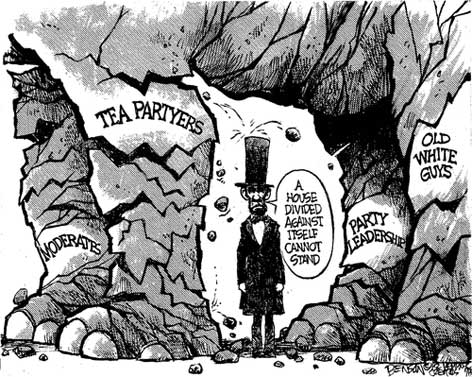By: Robert Jones
 Before Tina Fey had thought of anything else about 30 Rock, she knew she wanted an extremely conservative character played by Alec Baldwin. In her memoir Bossypants she discusses the genesis of the show: “A triangle between me, Alec Baldwin, and Tracy Morgan felt like it had potential. These three characters would have completely different views about any topic that came up—race, gender, politics, workplace ethics, money, sex, women’s basketball—and they would disagree in endless combinations.” The show revolves around the actions of these characters and others behind the scenes of The Girly Show (TGS), a late night live TV show organized and written by Tina Fey’s character Liz Lemon. TGS’s star is played by Tracy Morgan and Liz Lemon’s conservative boss, Jack Donaghy, is played by Alec Baldwin. Though the characters are well developed and interesting, it is the political commentary subtly woven into 30 Rock that deserves examination. By drawing a measured but satirical comparison of both sides, the show parodies modern politics while avoiding any harsh judgments of either ideology.
Before Tina Fey had thought of anything else about 30 Rock, she knew she wanted an extremely conservative character played by Alec Baldwin. In her memoir Bossypants she discusses the genesis of the show: “A triangle between me, Alec Baldwin, and Tracy Morgan felt like it had potential. These three characters would have completely different views about any topic that came up—race, gender, politics, workplace ethics, money, sex, women’s basketball—and they would disagree in endless combinations.” The show revolves around the actions of these characters and others behind the scenes of The Girly Show (TGS), a late night live TV show organized and written by Tina Fey’s character Liz Lemon. TGS’s star is played by Tracy Morgan and Liz Lemon’s conservative boss, Jack Donaghy, is played by Alec Baldwin. Though the characters are well developed and interesting, it is the political commentary subtly woven into 30 Rock that deserves examination. By drawing a measured but satirical comparison of both sides, the show parodies modern politics while avoiding any harsh judgments of either ideology.
30 Rock’s most obvious political references appear in the form of Jack Donaghy. Jack is portrayed as the archetypal conservative, consistently in favor of big business alongside his equally conservative CNBC news anchor wife. He takes a draconian approach to business and is extremely peeved when NBC is taken over by rival company Kabletown. The company is at odds with everything about him, emphasizing a family-first workplace and each individual worker’s “creative potential”. But this struggle does not lead him to more liberal beliefs. The Kabletown-NBC merger took place in season four, and a few seasons later Jack aggressively campaigns for Mitt Romney. In fact, in the very next season after the merger, Condoleezza Rice makes an appearance as a spurned ex-lover. By creating an exaggerated combination of businessman, playboy, and activist, the show sets him up as an ideal target for the liberal-leaning writers and producers who make up Liz Lemon’s TGS.
The show plays fair though, and Liz’s liberalism is as central to 30 Rock as Jack’s conservatism. In contrast to his ruthless ambition, Liz’s politics are driven by her emotions. It is normal for a single New Yorker to feel annoyed on Valentine’s Day, but how many can say they have invented their own holiday, complete with dispensing feminist critiques of the patriarchal society instead of chocolates and roses? This was the real plot of “Anna Howard Shaw Day,” a season four episode that suggests Liz’s politics may simply be a front for her middle-aged unhappiness. Her character also becomes famous for a self-help book for women titled Dealbreakers, which encourages women to dump their boyfriends for shady behavior instead of hanging on or trying to fix the problem. This is a fierce, feminist take on relationships, advocating female independence instead of blind acceptance of a boyfriend or husband’s faults. Rather than parodying one ideology and spotlighting one side as superior, 30 Rock shows the failings and successes of both sides.
It is not hard to extrapolate to real-world implications of 30 Rock’s tolerance. Away from the universe of TGS, Congress is trapped in unprecedented gridlock. Partisan tensions are high and compromise has been reduced to a dirty word reserved for closed-door meetings away from most of the party. Both sides say that bargaining is impossible when the opponent is so different, but consider Jack and Liz. He once endorsed a Congressional candidate who said, “If we have to have government, make it as small as possible. Dwarves. Tiny buildings. Pizza bagels for lunch.” She fell in love with a New York hipster who owned an organic hot dog stand. Obviously 30 Rock is only television, and other factors like lobbyists and voter expectations can prevent more personable communications. But if Jack and Liz can look past their disagreements, then maybe it is not so infeasible that Democrats and Republicans can finally start to work together again.
Fey’s writing is grounded in compassion, unlike the toxic atmosphere of Congress today. Liz and Jack often meet sometime each episode to discuss the issues of the week, with Liz usually criticizing Jack’s callousness and Jack reminding Liz that her liberal idealism can ultimately leave her upset and lonely. Even though both sides can be ridiculous, each is only human. 30 Rock is far from an allegory; and it seems clear that Tina Fey created Jack and Liz to carry the show’s action, not to purport her ideas about American government. But it is hard to look at such a relationship and not wonder why Congress cannot seem to get it right.

